|
Books Should Be Free Loyal Books Free Public Domain Audiobooks & eBook Downloads |
|
|
Books Should Be Free Loyal Books Free Public Domain Audiobooks & eBook Downloads |
|
Classics and Books from Antiquity |
|---|
|
Book type:
Sort by:
View by:
|
By: Anthony Trollope (1815-1882) | |
|---|---|
 Doctor Wortle's School
Doctor Wortle's School
Anthony Trollope’s fortieth novel, published in 1881, concerns a respectable Christian boys’ school whose proprietor unknowingly hires a woman who apparently has two husbands: A devoted English scholar and an abusive drunkard from the American south. The book interweaves a sensitive and realistic exploration of Dr. Wortle’s moral dilemma with a humorous look at small-town gossip and--of course--a romance involving the doctor’s beautiful young daughter. ( | |
By: Aristophanes (446BC - 385BC) | |
|---|---|
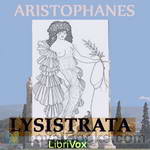 Lysistrata
Lysistrata
Lysistrata read by the Classics Drama Company at DePaul. The Classics Drama Company at DePaul is a new gathering of Thespians and Classicists dedicated to performing and understanding ancient literature. If you live in Chicago and attend DePaul University, we welcome new additions to our group. Contact Dr. Kirk Shellko (kshellko@depaul.edu), if interested.First performed in classical Athens c. 411 B.C.E., Aristophanes’ Lysistrata is the original battle of the sexes. One woman, Lysistrata, brings together the women of all Greece, exhorting them to withhold sexual contact from all men in order that they negotiate a treaty... | |
By: Aristotle (384 BCE-322 BCE) | |
|---|---|
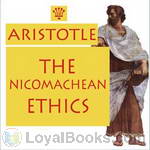 The Nicomachean Ethics
The Nicomachean Ethics
The work consists of ten books, originally separate scrolls, and is understood to be based on notes said to be from his lectures at the Lyceum which were either edited by or dedicated to Aristotle's son, Nicomachus. In many ways this work parallels the similar Eudemian Ethics, which has only eight books, and the two works can be fruitfully compared. Books V, VI, and VII of the Nicomachean Ethics are identical to Books IV, V, and VI of the Eudemian Ethics. Opinions about the relationship between the two works, for example which was written first, and which originally contained the three common books, is divided... | |
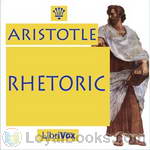 Rhetoric
Rhetoric
The Rhetoric was developed by Aristotle during two periods when he was in Athens, the first between 367 to 347 BCE (when he was seconded to Plato in the Academy), and the second between 335 to 322 BCE (when he was running his own school, the Lyceum). The Rhetoric consists of three books. Book I offers a general overview, presenting the purposes of rhetoric and a working definition; it also offers a detailed discussion of the major contexts and types of rhetoric. Book II discusses in detail the three means of persuasion that an orator must rely on: those grounded in credibility (ethos), in the emotions and psychology of the audience (pathos), and in patterns of reasoning (logos)... | |
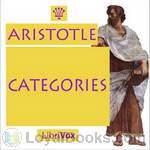 Categories
Categories
Categories is the first of Aristotle's six texts on logic which are collectively known as the Organon. In Categories, Aristotle enumerates all the possible kinds of things that can be the subject or the predicate of a proposition. Aristotle places every object of human apprehension under one of ten categories (known to medieval writers as the praedicamenta). Aristotle intended them to enumerate everything that can be expressed without composition or structure, thus anything that can be either the subject or the predicate of a proposition. The ten categories, or classes, are: Substance, Quantity, Quality, Relation, Place, Time, Position, State, Action and Affection. | |
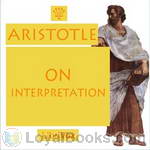 On Interpretation
On Interpretation
Aristotle's On Interpretation (Greek Peri Hermeneias) or De Interpretatione (the Latin title) is the second of Aristotle's six texts on logic which are collectively known as the Organon. On Interpretation is one of the earliest surviving philosophical works in the Western tradition to deal with the relationship between language and logic in a comprehensive, explicit, and formal way. The work begins by analyzing simple categoric propositions, and draws a series of basic conclusions on the routine... | |
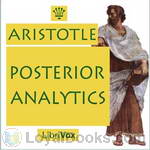 Posterior Analytics
Posterior Analytics
Posterior Analytics is the fourth of Aristotle's six texts on logic which are collectively known as the Organon ("Instrument"). Posterior Analytics deals with demonstration, definition, and scientific knowledge. Demonstration is distinguished as a syllogism productive of scientific knowledge, while Definition is marked as the statement of a thing's nature, a statement of the meaning of the name, or of an equivalent nominal formula. | |
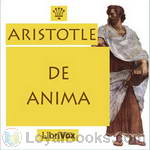 De Anima
De Anima
On the Soul (Greek Περὶ Ψυχῆς (Perì Psūchês), Latin De Anima) is a major treatise by Aristotle on the nature of living things. His discussion centres on the kinds of souls possessed by different kinds of living things, distinguished by their different operations. Thus plants have the capacity for nourishment and reproduction, the minimum that must be possessed by any kind of living organism. Lower animals have, in addition, the powers of sense-perception and self-motion (action). Humans have all these as well as intellect... | |
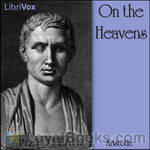 On the Heavens
On the Heavens
On the Heavens (Greek: Περί ουρανού, Latin: De Caelo or De Caelo et Mundo) is Aristotle's chief cosmological treatise. In it Aristotle argues that the Earth is a sphere by pointing to the evidence of lunar eclipses. Aristotle also provides a detailed explanation of his theory of 'gravity' arguing that things which contain 'earth' fall towards the centre of the Universe because 'earth' is naturally attracted to the centre of the Universe. Aristotle argues that if the planet Earth was moved to the location of the Moon then objects which contain 'earth' would not fall towards the centre of the Earth but rather towards the centre of the Universe... | |
 On Generation and Corruption
On Generation and Corruption
On Generation and Corruption (Ancient Greek: Περὶ γενέσεως καὶ φθορᾶς, Latin: De Generatione et Corruptione, also known as On Coming to Be and Passing Away) is a treatise by Aristotle. Like many of his texts, it is both scientific and philosophic (although not necessarily scientific in the modern sense). The philosophy, though, is essentially empirical; as in all Aristotle's works, the deductions made about the unexperienced and unobservable are based on observations and real experiences... | |
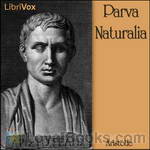 Parva Naturalia
Parva Naturalia
Parva Naturalia [the "short treatises on nature" (a conventional Latin title first used by Giles of Rome)] is a collection of books by Aristotle, which discuss natural phenomena involving the body and the soul. The books are as follows:I - On Sensation and the SensibleII - On Memory and RecollectionIII - On Sleeping and WakingIV - On DreamsV - On Prophecy in SleepVI - On Longevity and Shortness of LifeVII - On Youth and Old Age, Life and Death VIII - On Respiration | |
 On the Parts of Animals
On the Parts of Animals
On the Parts of Animals by Aristotle . The first book asks whether animals were designed or came into existence by chance. The remaining three books focus on particular examples of various animals and the functions of their organs. The translator William Ogle, who was both a medical doctor and classicist, presented Charles Darwin with a copy of this translation. | |
 History of Animals
History of Animals
Book I Grouping of animals and the parts of the human body. Book II Different parts of red-blooded animals. Book III Internal organs. Book IV Animals without blood . Books V & VI Animal reproduction. Book VII Human reproduction. Book VIII Habits . Book IX Social behavior. Book X Dealing with barrenness in women was excluded from the translation of D'Arcy Thompson for being spurious so the translation of the Clergyman Richard Cresswell is used instead. Sir D'Arcy Wentworth Thompson was a biologist, mathematician and classicist who also wrote On Growth and Form which discusses the mathematical patterns and structures formed in plants and animals. | |
By: Austen Layard (1817-1894) | |
|---|---|
 Discoveries Among the Ruins of Nineveh and Babylon
Discoveries Among the Ruins of Nineveh and Babylon
Austen Henry Layard is best known as the excavator of Nimrud and of Nineveh, where he uncovered a large proportion of the Assyrian palace reliefs known, and in 1851 the library of Ashurbanipal. The Royal Library of Ashurbanipal, named after Ashurbanipal, the last great king of the Assyrian Empire, is a collection of thousands of clay tablets and fragments containing texts of all kinds from the 7th century BC. Among its holdings was the famous Epic of Gilgamesh.In this work, he describes his experiences upon his return to the region for a second expedition. - Summary by Soupy Proof-listened by Elijah Fisher and TriciaG. | |
By: Benjamin Hathaway (1822-1896) | |
|---|---|
 1001 Questions and Answers on General History
1001 Questions and Answers on General History
A book for students of history to test their knowledge and to direct their studies. As the title tells us, this is a book of 1001 questions, with answers, regarding world history. - Summary by KevinS | |
By: Bernhard Pick (1842-1917) | |
|---|---|
 Apocryphal Acts of Paul, Peter, John, Andrew and Thomas
Apocryphal Acts of Paul, Peter, John, Andrew and Thomas
The full title of this book, published in 1909, is The Apocryphal Acts of Paul, Peter, John, Andrew and Thomas. As early as the second century, numerous legends concerning the fates of the Christian apostles were in circulation. These Acts, widely regarded as originating circa 150 CE, are among the earliest accounts still in existence of the lives, preaching and martyrdoms of the apostles Paul, Peter, John, Andrew and Thomas. They are written in a fantastic and romantic style, and although they were influential in later Christian conceptions of these apostles, they are historically worthless as biographies... | |
By: Charles Dickens | |
|---|---|
 Great Expectations
Great Expectations
From the opening passage itself of Great Expectations by Charles Dickens, the reader is drawn into the world of the hero, Pip, who is at that time, seven years old. The author creates an unforgettable atmosphere: the gloom of the graveyard, the melancholy of the orphan boy, the mists rising over the marshes and the terrifying appearance of an escaped convict in chains. Told in first person (one of the only two books that Dickens used this form for, the other being David Copperfield) Great Expectations is a classic coming of age novel, in which we trace the growth and evolution of Pip or Philip Pirrip to give his full name... | |
By: Charles Merivale (1808-1893) | |
|---|---|
 Roman Triumvirates
Roman Triumvirates
In this short volume, the British historian, Charles Merivale, describes the long conflict by which the rule of one man replaced the Roman Republic. Here we meet that ineffectual has-been Pompeius, the resourceful military and political genius, Julius Caesar, unbending Cato, brave, dissolute Marcus Antonius, grandiloquent, doomed Cicero, peerless Cleopatra and, almost the sole survivor, crafty, cold, and sagacious young Octavius | |
By: Charlotte Maria Tucker (A. L. O. E.) (1821-1893) | |
|---|---|
 Stories of the Wars of the Jews
Stories of the Wars of the Jews
Stories of the Wars of the Jews from the Babylonish captivity, to the destruction of Jerusalem by Titus is a historical narrative spanning Jewish history from 586 B.C.E to 70 A.D. There is no history more fraught with interest, or conveying more important lessons than that of God’s chosen nation. There are no annals which display instances of more heroic courage, faith, and self-devotion and of darker apostasy and crime,—than those of the descendants of Abraham. | |
By: Cyril of Alexandria (376-444) | |
|---|---|
 That Christ Is One
That Christ Is One
Cyril of Alexandria was the leading voice of Nicene orthodoxy in the Christological controversies between Constantinople (381) and Chalcedon (451). Assuming the mantle of the Cappadotian fathers, he answered the auguments of Nestorius who had changed the liturgy of Constantinople by altering the prayer which referred to Mary as the Mother of God. Although he died seven years before the Council of Chalcedon, his writings and formulations heavily influenced not only Chalcedon, but the entire trajectory of orthodox christological thought. | |
By: Decimus Iunius Iuvenalis (-2nd Cent.) | |
|---|---|
 Satires
Satires
Decimus Iunius Iuvenalis, known in English as Juvenal, was a Roman poet active in the late 1st and early 2nd century AD. The details of the author's life are unclear, although references within his text to known persons of the late 1st and early 2nd centuries AD fix his terminus post quem (earliest date of composition). The Satires are a collection of satirical poems by Juvenal written in the late 1st and early 2nd centuries AD. Juvenal is credited with sixteen known poems divided among five books; all are in the Roman genre of satire, which, at its most basic in the time of the author, comprised a wide-ranging discussion of society and social mores in dactylic hexameter... | |
By: Dorothy Mills | |
|---|---|
 Book of the Ancient Greeks
Book of the Ancient Greeks
An Introduction to the History and Civilization of Greece from the Coming of the Greeks to the Conquest of Corinth by Rome in 146 B.C. The spirit of a nation is expressed and its history is recorded in three ways: in its political history, in its literature and in its art. The aim of this book has been to use such parts of the political history of the Greeks, of their literature and of their art as seem to have been the outward and visible signs of the spirit that inspired them. - Summary from... | |
By: E. A. Wallis Budge (1857-1934) | |
|---|---|
 Babylonian Story of the Deluge and the Epic of Gilgamesh: with an Account of the Royal Libraries of Nineveh
Babylonian Story of the Deluge and the Epic of Gilgamesh: with an Account of the Royal Libraries of Nineveh
A short monograph devoted to the Babylonian flood myth and the Epic of Gilgamesh , dating from the 7th century BC, as found on the clay tablets of the Royal Library of Ashurbanipal at the ancient site of Nineveh, capital of the Neo-Assyrian Empire. The book includes a description of the library and an account of its discovery. The narratives are conveyed through a combination of verbatim translation and paraphrase. The text contains eighteen illustrations. - Summary by Kazbek | |
By: E.M. Berens | |
|---|---|
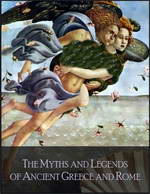 Myths and Legends of Ancient Greece and Rome
Myths and Legends of Ancient Greece and Rome
Silver footed, fair haired Thetis, Ares the God of War, Nike the Goddess of Victory, The Furies and The Muses, Zeus the presiding deity of the Universe and the magical, mysterious Olympus, are some of the amazing, mythical Greek and Roman deities you'll encounter in this book. Myths and Legends of Ancient Greece and Rome by EM Berens was originally intended for young readers. Written in an easy and light style, the author attempts to bring the pantheon of gods into a comprehensible format.... | |
By: Edgar James Banks (1866-1945) | |
|---|---|
 Seven Wonders of the Ancient World
Seven Wonders of the Ancient World
The 7 Wonders of the Ancient World is a list of masterpieces of architecture and art of classical antiquity. First compiled in the second century BC, it served as a guidebook for the interested Hellenic traveller. This small book gives an introduction to all the entries on the list: The Pyramid of Khufu, the Walls of Babylon, the Satue of the Olympian Zeus, the Temple of Diana , the Tomb of King Mausolus, the Colossus of Rhodes, and the Pharos of Alexandria. Sadly for the modern tourist, all but the Pyramid of Giza have been destroyed centuries ago. | |
By: Edward Taylor Fletcher (1816-1897) | |
|---|---|
 Lost Island of Atlantis
Lost Island of Atlantis
In this paper, read before the Literary and Historical Society, Quebec, Fletcher demonstrates methodically what he perceives as evidence for the existence of the island of Atlantis. He begins by documenting the historical instances Atlantis is referred to in ancient texts, even if only as a myth , continues on to analyze linguistic elements that might indicate an Atlantean origin , and also presents a connection between the American and the European fossil flora and amber fauna, suggesting that Atlantis is the missing link ... | |
By: Elizabeth Cary (1585-1639) | |
|---|---|
 Tragedy of Mariam
Tragedy of Mariam
The Tragedy of Mariam (1613) is the first original drama written in English by a woman. Elizabeth Cary drew on Jewish histories by Josephus to create a closet drama (written to be read, rather than performed live) about Mariam, the second wife of Herod the Great. At the beginning of the play, Mariam believes that Herod has been killed by Octavius, and struggles with how to respond. On the one hand, she is relieved, as she is angry with Herod for killing her brother and grandfather. On the other, she knows that he loved her, and she feels caught by her sense of duty as his wife. When Herod unexpectedly returns, Mariam must decide what to do. | |
By: Emilie Kip Baker (1873-1951) | |
|---|---|
 Stories of Old Greece and Rome
Stories of Old Greece and Rome
The Stories of Old Greece and Rome is an easy to read summary of all of the famous and not so famous Greek and Roman mythological stories. All of the famous Heroes are here: Theseus, Jason, Hercules, and all of the well known Deities. These stories tell the real detail of the myths, not the ones that have become sanitized (and dare I say it, 'Disneyfied') over the centuries. These are not stories for children, as the old gods and heroes were vengeful and some might say sadistic in their treatment of minor slights and misdemeanors... | |
By: Epictetus | |
|---|---|
 Discourses of Epictetus
Discourses of Epictetus
Philosophical discourses of Epictetus as recorded by his affectionate student, Arrian. One main precept expounded is that we do not fear events but rather our thoughts about those events. | |
By: Etheria | |
|---|---|
 Pilgrimage Of Etheria
Pilgrimage Of Etheria
This late fourth century common era narrative of a Christian pilgrimage is the earliest such text which survives to us. It is an important source of information about early Christian practices. This book has an extended introduction which provides invaluable context and summaries, though some of it is a bit scholarly and dry. The text is damaged with some parts missing; missing parts will be designated in this recording by this verbal usage: “dot dot dot dot” . More information: Egeria, Etheria or Aetheria was a woman, widely regarded to be the author of a detailed account of a pilgrimage to the Holy Land... | |
By: Euripides (480-406 BC) | |
|---|---|
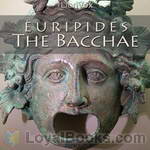 The Bacchae
The Bacchae
This tragedy is based on the mythological story of King Pentheus of Thebes and his mother Agave, and their punishment by the god Dionysus (who is Pentheus' cousin) for refusing to worship him. | |
By: Flavius Josephus (37 - c.100) | |
|---|---|
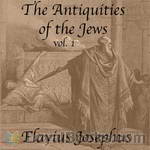 The Antiquities of the Jews
The Antiquities of the Jews
Antiquities of the Jews was a work published by the important Jewish historian Flavius Josephus about the year 93 or 94. It is a history of the Jewish people, written in Greek for Josephus' gentile patrons. Beginning with the creation of Adam and Eve, it follows the events of the historical books of the Hebrew Bible, but sometimes omits or adds information.Volume 1 contains Books 1-5 and ends with the dedication of Samuel and death of Eli the priest. | |